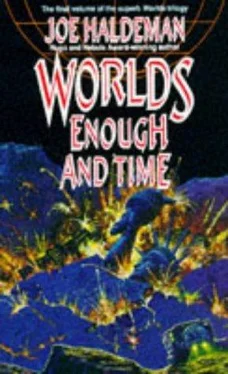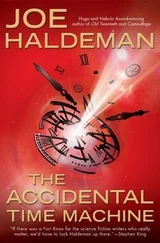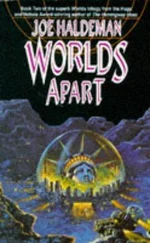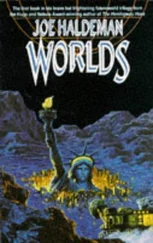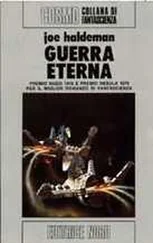We weren’t able to get anything from New New York. We picked up a lot of radio noise from them until they stopped dead. But we were still a couple of years away from being able to broadcast then.
That B.A. isn’t very useful: Political Science, with some graduate work in forensics and management. No real science. I can barely do algebra; calculus is just a word to me. My main function here is teaching, but I can’t teach anybody anything technical.
There are bright kids here and they can figure out a lot on their own—one of them got this transmitter going and pointed at you—but they need to talk to real engineers and scientists, even with a twoor three-year time lag.
There may be many other enclaves like this somewhere in the world, but so far we haven’t heard of them. We have made contact with two other radio transmitters: one in Brazil and one in Poland. So far we haven’t done much but exchange names and locations. We desperately need language texts, or at least dictionaries, in Polish and Portuguese.
Anyhow, you can see the fix we’re in. The only books we have are old-fashioned paper ones. Most of the information in them is inapplicable or just plain wrong. We desperately need to copy things from your up-to-date library.
I’m sure that somewhere on this planet we’ll find a large electronic library intact, like a physical backup to the Library of Congress—I know that the actual hadron matrix for something like that is about the size of a small floater, and there are dozens of copies around the country—but as things stand right now, even if we found one, we wouldn’t be able to tap it.
Let me close off on a personal note. We saw the starship leave back in ’97. That was fast work; I have some idea of how huge a project it was, and I suspect you were in a hurry because you were afraid of another war, afraid of Earth.
That seems ludicrous on the face of it, since we’re little more than a band of savages capering around the mysterious remnants of an advanced civilization. We lack both knowledge and context. Context is the personal part.
(He gestures at the radio telescope behind him.) The boys and girls who fixed up that dish lived around it for years without even knowing what it was. I had to tell them. Then they had to learn to read, and find books; eventually, books about electronics.
People with my disorder don’t live too long. What will happen after I’m dead? What obvious things are going to be overlooked forever, because there’s nobody alive who remembers real life, life before the war?
Assuming something terrible did happen, and New New York is dead—then you people are the only human link that Earth will have with its past. You’re going to have to supply the context, if Earth is going to be rebuilt.
Don’t be afraid of us. The madmen, the mad governments, who started the war are memories now, less than memories. This is a planet of innocent children. They need your help to survive.
Hope I’m not talking to empty space. We had to make various assumptions—that your target star was still Epsilon Eridani, that you would be listening to the 21-centimeter line, 1420 megahertz. That you still survive.
Marianne… uh, what can I say? I hope to hear from you in a couple of years. (Laughs) Hope you’re enjoying your trip. Life is not bad here, considering.
I must look awful strange. (Rubs his beard) You remember me as a young man—and in my mind you’re still my twenty-four-year-old bride, though twice that time has passed for you. Not quite twice for you, I guess, with relativity.
I never fathered any children, of course, though I’ve raised a few. Hope you have, too.
Love you still.
PRIME
The ten years that followed renewed contact with Earth were very interesting for O’Hara and for Newhome in general, but I must necessarily present them here in concentrated form. When I relate this story to other machine intelligences, these ten years are given about the same amount of attention as any other ten in O’Hara’s centuryplus. This document, however, is limited by various storytelling constraints having to do with unity and balance.
In fact, one could compose several interlocking novels covering this ten-year span, and each one would be a worthy chronicle. But to put them inside another novel would be a topological impossibility. So I will relate them in abbreviated form, each one illuminated by an entry from O’Hara’s diary, or a similar document.
THE NOVEL OF JOHN’S DISASTER
John Ogelby was surprised to find out how much he enjoyed being a father, or uncle, or grandfather-figure. Nineteen years older than O’Hara, he was sixty-three when Sandra left the creche and moved into their lives.
Like Daniel, he had assumed that Sandra was going to be O’Hara’s project, with himself a more or less inactive bystander. The little girl saw things differently, though.
Children usually were fascinated by John, since they were fascinated by the strange, and John looked like a creature out of a fairy tale. He’d grown used to their stares and questions long before he emigrated from Ireland to New New, seeking low gravity to ease the pain of his twisted back. Birth defects were rare in New New, but deformation was not, since space is unforgiving, and will repay a moment’s inattention with a limb torn off, or a face. So children were always asking him what did he do to get like that?
It was a question he had asked, himself, when he was young. His parent’s assurances that God had done it to test his faith did not leave him well disposed toward God. John gave up on religion long before he went off to Trinity, to Cambridge, to the Cape and space.
Sandra hadn’t asked him that question, since her mother had prepared her. She did have other questions, as they got to know each other: can’t they fix it? (They could have, when he was young, if there had been money.) Why’d they let him be born? (Abortion was illegal at the time and place of his birth.) Did he have brothers or sisters with bad backs? (No, his father had practiced a time-honored form of birth control: leaving with another woman.) Did he ever wish he hadn’t been born? (Everybody does, sometimes, if they live long enough.)
John wasn’t sure how to act around children. His own childhood had not given him any reason to like the little bastards, so he had avoided them all his life, which had required small effort in New New and none at all in the starship, at least until they geared up the baby factory. As Sandra approached the age of eight, he resigned himself to the occasional interference with his orderly life. But nothing prepared him for falling in love.
It was a mutual chemistry of discovery and fascination. The adult males in Sandra’s life, her creche fathers, were all cast from the same mold: self-assured, endlessly patient, mildly but consistently authoritarian. Uncle John was like a different species. He never told her what to do. He was likely to answer a question with another question, or a paradox. He was sarcastic, oblique, darkly humorous but always serious.
Usually when Sandra talked to adults she rightly sensed they were only partly there. Uncle John gave her all of his attention, as if studying her, and talked to her carefully but without condescension. He was real to her in a constant way that no other grown-up, not even her mother, had ever been.
John didn’t try to analyze his fascination with her beyond the obvious fact that she was a genetic duplicate of the woman he loved most, the woman who had rescued him from a life of disconnection, alienation, self-destruction. She had novelty value, too, and presented a learning experience, since he had never watched a child grow. She seemed unusually alert and creative, but he admitted to a lack of comparative data.
Читать дальше
